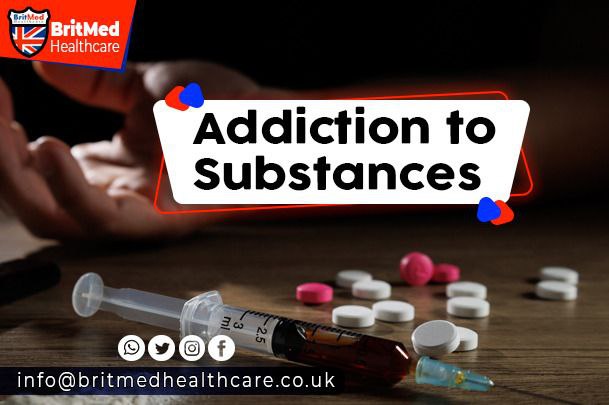Addiction to Substances:
Millions of individuals worldwide are impacted by the complicated issue of drug addiction, which has dire repercussions. It poses serious challenges to individuals, their families, and society as large because it is a chronic illness. However, new approaches to treating drug addiction have been made possible by scientific and technological
advancements. This article addresses the best practices for treating drug addiction and provides a thorough, scientific review of such practices. Make an appointment for your first consultation by getting in touch with us right now.
Addiction to drugs: what is it?
The hallmark of drug addiction, also known as substance, use disorder, is an insatiable urge to consume substances in spite of the risks involved. Numerous brain circuits, including those involved in reward, motivation, learning, and memory, are disrupted by the illness. People find it more difficult to give up drugs on their own as a result
of these changes. It is crucial to comprehend the brain underpinnings of drug addiction in order to create therapies that work.
What are the strategies used to treat drug abuse?
medication-based treatment Pharmaceuticals, psychotherapy, and behavioral therapies are all part of medication-assisted treatment. Treating opioid addiction with this all-encompassing strategy is highly successful.
Patients can more easily concentrate on their rehabilitation when cravings and withdrawal symptoms are lessened by FDA-approved drugs including methadone, buprenorphine, and naltrexone. Medication-assisted treatment dramatically lowers opioid usage and improves the likelihood of long-term recovery, according to a study published in the Journal of Addiction Medicine.
Counseling in behavior: The cornerstone of addiction treatment is behavioral therapy.
Patients who receive cognitive behavioral therapy are better able to identify and modify thought and behavior patterns linked to drug use. Positive actions are also rewarded in the real world through therapy. According to research published in the American Journal of Psychiatry, behavioral therapy helps patients with substance use disorders achieve better mental health outcomes and lower relapse rates.
Digital interventions: Strong new instruments in the treatment of addiction include digital therapies, which include online resources and smartphone apps. Individualized treatment regimens, real-time monitoring, and round-the-clock care are provided by these technologies. Digital interventions can successfully supplement traditional therapies, improving adherence and producing favorable results, according to a randomized controlled experiment published in The Lancet.
complementary and alternative therapies: A growing number of people are turning to integrated methods of treating addiction, like yoga, meditation, acupuncture, and art therapy. The physical, mental, and emotional components of addiction are all addressed in these therapies, which also advance general health. Integration of holistic techniques in addiction treatment has been shown to improve stress management and avoid relapses,
according to a review published in the journal Substance Abuse Treatment.
Treatment with neurofeedback: In order to teach patients how to control brain activity, neurofeedback therapy monitors brain activity in real time. This method works especially well for treating co-occurring conditions like depression and anxiety, which frequently coexist with addiction. Neurofeedback has been shown to significantly reduce substance usage and improve emotional regulation, according to studies in neuropsychopharmacology.
Innovation and research in the future
Research on genes: Genetic developments provide insight into the hereditary components of addiction. Comprehending these variables can result in customized treatment regimens that suit a person genetic composition. Targeted therapies are now possible since natural genetics research has confirmed the relevance of specific genetic variations in addiction vulnerability.
VR treatment: Through the use of virtual reality therapy, patients are placed in safe, regulated situations where they can safely face and overcome stimuli. Resilience and coping skills are strengthened by this creative strategy. Virtual reality treatment is an excellent way to lessen drug-related anxiety and cravings, according to a Psychology study.
Systems of community and assistance.
peer-assistance: organizations A key component of the healing process is peer support groups. These
organizations provide people a feeling of community and shared experience, which can be incredibly inspiring. Peer support group involvement dramatically improves recovery outcomes and lowers relapse rates, according to a meta-analysis published in Substance Abuse Treatment, Prevention, and Policy.
Treatment for families: The patient family is included in the treatment process when they receive family therapy. Relationships are repaired and a home atmosphere conducive to healing is created with this method. Family participation may be a key component of long-term rehabilitation success, according to research published in the Journal of Marital and Family Therapy.
Initiatives to raise public awareness: In order to lessen stigma and motivate people to seek help, it is crucial to increase public knowledge about the realities of addiction and the options for treatment that are available. An analysis of public awareness programs' success in raising awareness and modifying attitudes regarding addiction can be found in a report published by the National Institute on Drug Abuse.
In conclusion
A variety of medical, psychological, and social interventions are needed along the complex road
to drug addiction therapy. Those fighting addiction can find hope and practical answers with the
help of contemporary techniques supported by scientific research. We can increase drug
addiction recovery rates and assist people in leading better, more fulfilling lives by using a
thorough, evidence-based approach.
Websites related to the article
British Psychological Society: https://www.bps.org.uk/
National Health Service (NHS): https://www.nhs.uk/
Britmed Healthcare: https://britmedhealthcare.co.uk/
Nightingale Hospital: https://www.nightingalehospital.co.uk/




